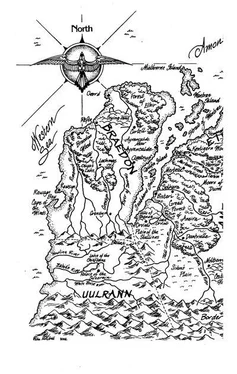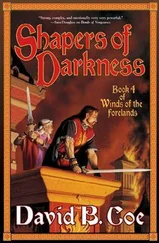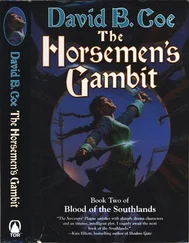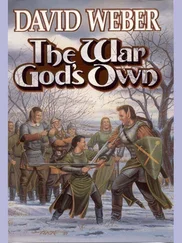David Coe - Weavers of War
Здесь есть возможность читать онлайн «David Coe - Weavers of War» весь текст электронной книги совершенно бесплатно (целиком полную версию без сокращений). В некоторых случаях можно слушать аудио, скачать через торрент в формате fb2 и присутствует краткое содержание. Жанр: Фэнтези, на английском языке. Описание произведения, (предисловие) а так же отзывы посетителей доступны на портале библиотеки ЛибКат.
- Название:Weavers of War
- Автор:
- Жанр:
- Год:неизвестен
- ISBN:нет данных
- Рейтинг книги:5 / 5. Голосов: 1
-
Избранное:Добавить в избранное
- Отзывы:
-
Ваша оценка:
- 100
- 1
- 2
- 3
- 4
- 5
Weavers of War: краткое содержание, описание и аннотация
Предлагаем к чтению аннотацию, описание, краткое содержание или предисловие (зависит от того, что написал сам автор книги «Weavers of War»). Если вы не нашли необходимую информацию о книге — напишите в комментариях, мы постараемся отыскать её.
Weavers of War — читать онлайн бесплатно полную книгу (весь текст) целиком
Ниже представлен текст книги, разбитый по страницам. Система сохранения места последней прочитанной страницы, позволяет с удобством читать онлайн бесплатно книгу «Weavers of War», без необходимости каждый раз заново искать на чём Вы остановились. Поставьте закладку, и сможете в любой момент перейти на страницу, на которой закончили чтение.
Интервал:
Закладка:
“The king is asking for you, Archminister.”
She looked up to see her shadow standing over her. She hadn’t noticed before how young he was, but it was said that fear did that to a soldier, robbed him of his years as well as his nerve, making him a babe once more.
“All right,” she said, stiffly getting to her feet. “Tell him I’ll be along in a moment.”
He nodded and started to walk away.
“Are the empire’s men moving yet?” she asked.
“No, not yet. But soon. Captain says they want to wear us down before Shanstead arrives.”
It was more than he had said to her since they marched from Audun’s Castle.
It’s only going to get worse, Grinsa had told her the day before. And the Weaver had echoed that in her dream. You understand that there will be more of this. Imagining the unimaginable, a war between Weavers, Keziah knew that they were right. The soldier was watching her, not with suspicion, as he usually did, but with need, his eyes begging her to reassure him, to tell him that Marston and the Thorald army would arrive in time.
All she could do was turn her back on him and reach for her belt and blade.
Chapter Seven
Galdasten, Eibithar
It was a siege without blood, a war without swords, at least for the people of Galdasten. Bodies still washed ashore occasionally, bloated and foul, still held together by the purple and gold uniforms that bound them. Braedon’s men had recovered their own from the waters after the naval battle ended and Eibithar’s fleet, or what little was left of it, fled Falcon Bay. But they had left Eibithar’s dead to the surf.
It was but one indignity among many. The emperor’s men had set fire to much of the city before marching past the castle and on toward the Moorlands. Those soldiers who remained-perhaps six hundred-had garrisoned themselves in the few homes and buildings they left standing. They patrolled the city as if they owned it, enforcing a strict curfew, closing the taverns, taking the ale and food for themselves, and confiscating the wares of those peddlers foolish enough to enter Galdasten. They maintained a presence outside the walls of Galdasten Castle, but they needn’t have bothered. Renald, Galdasten’s duke, had no intention of challenging their supremacy within his city, nor had he shown any willingness to pursue the bulk of Braedon’s army, which had long since marched southward.
Pillad jal Krenaar, Galdasten’s first minister, felt certain that even as the men and women of the city took refuge in the wards of the duke’s castle, they cursed Renald’s name, seeing him as a traitor to his realm and his people. Had the minister been in their position, he would have done the same. He was just as certain that Renald suffered for his own compliance with the enemy. He seldom left his chambers, speaking only with the duchess, his swordmaster, and Pillad, who had managed at last to regain the trust of Galdasten’s Eandi leaders.
Pillad’s betrayal of the Qirsi barkeep in Galdasten City had been but the beginning of an ordeal he thought might end with his own execution. Indeed, had he known what his accusations against Mittifar jal Stek would do to his own life, he might never have made them in the first place. But on that day in Elined’s turn he hadn’t been thinking at all. He had been angry, still smarting from the humiliation of the tavern keeper’s refusal to serve him Thorald ale. He had also grown weary of being ignored, of being viewed by Qirsi and Eandi alike as useless. He was eager to reclaim his influence within Renald’s court, and he had known that by sacrificing Mittifar, like Pillad, a member of the Weaver’s conspiracy, he would enhance his own influence.
He had been pleased with himself when the duke’s men left the castle to arrest the man. When they returned empty-handed and reported to Renald that the tavern keeper was dead, Pillad felt his entire world shudder, as if Elined had pounded at Galdasten Tor with her mighty fist. The duchess accused him of being a liar and traitor, of arranging the tavern keeper’s murder in order to gain the duke’s trust while at the same time masking his own treachery. She even speculated that he had broken Mittifar’s neck himself, though this much Renald and his swordsmaster told her was impossible. Ewan Traylee pointed out that the tavern keeper had been too large and powerful for a man of Pillad’s stature to best in a physical fight, and the duke made it clear that Pillad didn’t possess shaping power. Still, the accuracy of her accusation left the first minister so badly shaken that he barely managed to speak in his own defense.
Yet what disturbed him even more than Elspeth’s allegations was the fact that Mittifar had been murdered. He never had any doubt that the conspiracy was responsible, which meant that they knew what Pillad had done before Renald’s soldiers reached the tavern, quite possibly before they even left the castle. There were other traitors in Galdasten, at least one of them in Renald’s court.
Having no proof that Pillad was a traitor, they could not imprison him. So it was that he was in his chamber two nights later when the Weaver came to him in a dream, incensed and bent on vengeance. Never before had the minister endured such torment, and he hoped that he would die rather than suffer it again. The man burned him with white-hot flames, blackening the flesh on Pillad’s chest and back. He broke the minister’s ribs one by one, healed them, then broke them again. And all the while he raged at him for his betrayal. Pillad couldn’t remember any of what the Weaver said, having heard the words through a blinding haze of agony, but he did recall that the Weaver understood why he had done it, and that he expected Pillad to regain Renald’s confidence eventually.
Pillad remembered something else from that night as well, a detail that reached him through the pain and terror and stuck in his mind long after he had awakened. All of the injuries dealt him by the Weaver were to his torso, where they would remain hidden from Galdasten’s Eandi. Even as he seethed, the Weaver recognized that Pillad had made himself valuable to the movement once more. Renald would turn to him again, would heed his advice and share with the minister his plans for answering the Braedony invasion. That must have been why the Weaver didn’t kill him, why, in fact, he mended all the wounds he inflicted on him. In the midst of his torture, this realization sustained Pillad, gave him strength he hadn’t known he possessed, served as a balm for his injuries. He mattered again. He had wondered for so long if he would.
The duke’s suspicions lingered for some time. Elspeth’s had yet to fade entirely. But finally, in only the last few days, the minister had been welcomed back into the court. There was never any formal acknowledgment of this; he received no apology from Renald for his lack of faith, nor did the duke even ask him to join his daily discussions with the swordmaster. Just the other morning, nearly a full turn after the tavern keeper’s death, Pillad was in Renald’s chambers answering yet another round of questions about Mittifar and what Pillad had seen in his visits to the White Wave. After perhaps an hour Ewan arrived to discuss military matters with the duke, as he did every day. On this morning, however, Renald did not ask the minister to leave. Instead he launched directly into his conversation with the swordmaster. Pillad’s exile was over.
That very night the Weaver came to him once again, and though Pillad’s climb to the plain where the man awaited him might have been somewhat more arduous than he recalled from previous dreams, nothing else about the encounter struck him as unusual. The Weaver asked him if Renald had come to trust him again, but clearly he knew the answer already. He asked about Renald’s plans, and he told the minister that the time was fast approaching when he would reveal himself to all the Forelands.
Читать дальшеИнтервал:
Закладка:
Похожие книги на «Weavers of War»
Представляем Вашему вниманию похожие книги на «Weavers of War» списком для выбора. Мы отобрали схожую по названию и смыслу литературу в надежде предоставить читателям больше вариантов отыскать новые, интересные, ещё непрочитанные произведения.
Обсуждение, отзывы о книге «Weavers of War» и просто собственные мнения читателей. Оставьте ваши комментарии, напишите, что Вы думаете о произведении, его смысле или главных героях. Укажите что конкретно понравилось, а что нет, и почему Вы так считаете.












